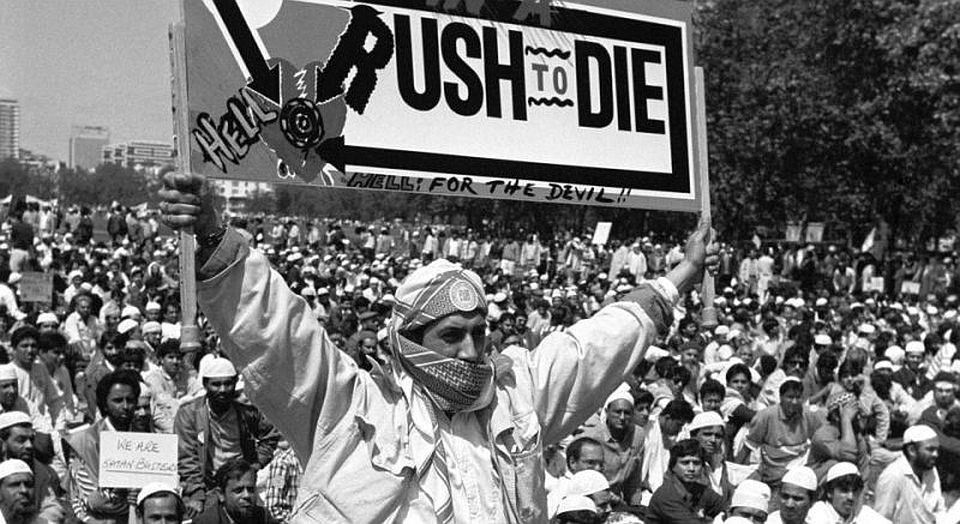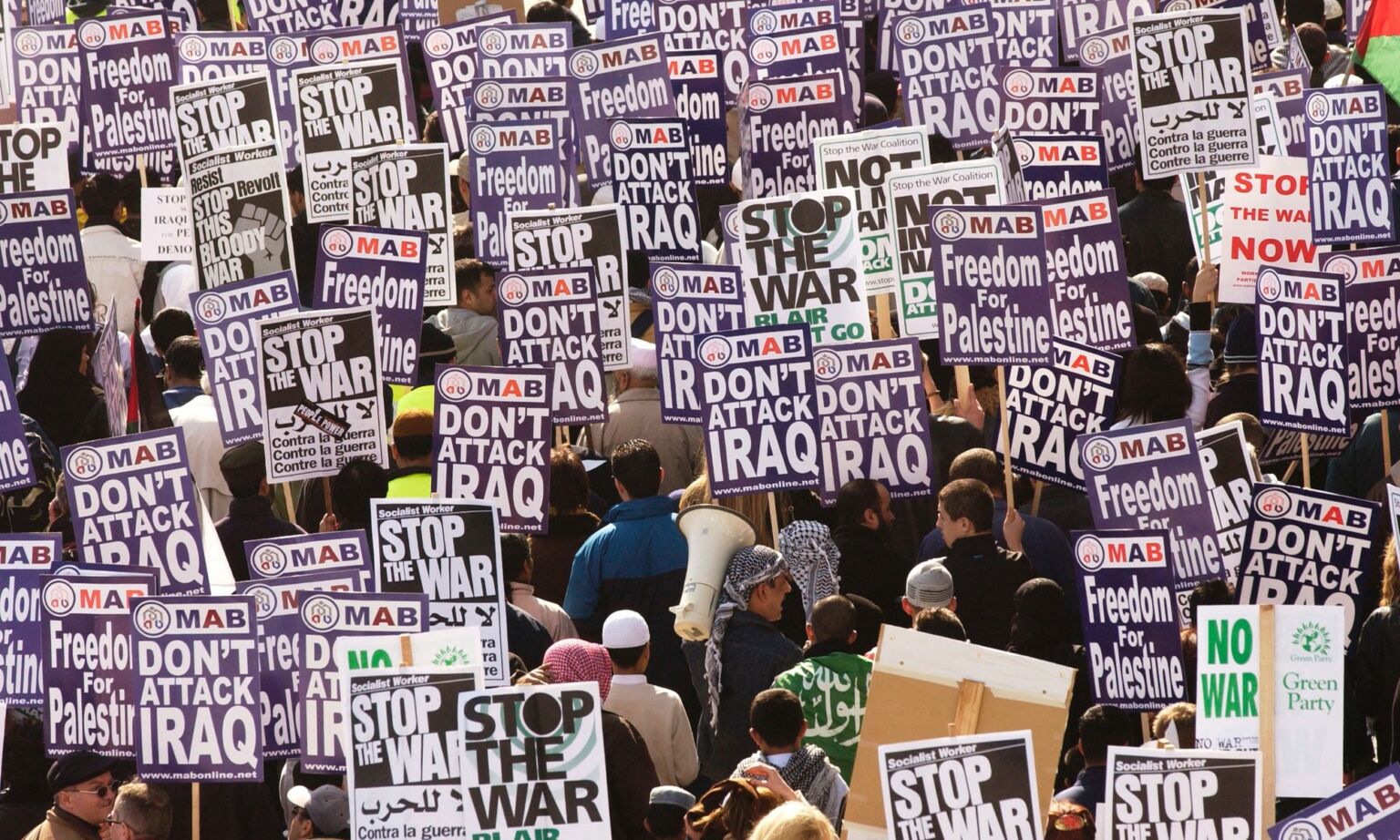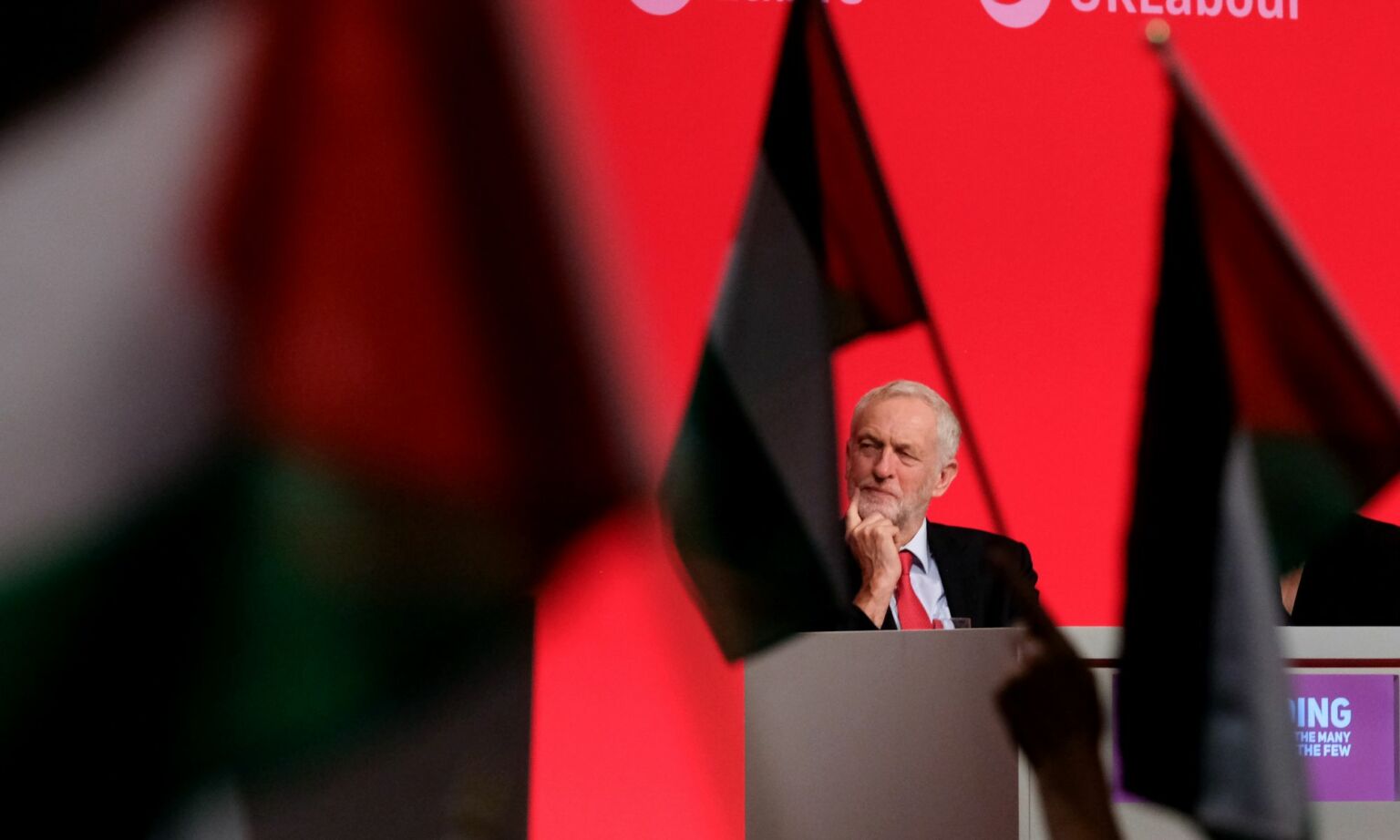
Long-read
The sinister rise of the Islamo-left
How ‘progressives’ became the allies of Islamist reactionaries.
Want to read spiked ad-free? Become a spiked supporter.
Is Hamas a terrorist group? This was the question posed to former UK Labour leader Jeremy Corbyn by Piers Morgan on his Monday evening TalkTV show. It wasn’t a difficult question. Corbyn was being invited to condemn a group that had raped, tortured and slaughtered hundreds upon hundreds of Israelis just over a month ago, on 7 October.
Yet Corbyn couldn’t do it. Morgan asked the same question no fewer than 15 times. Each time, Corbyn, growing ever more irascible, avoided answering. He preferred instead to witter on about needing to ‘start a process that leads to a ceasefire’. His programming just wouldn’t allow him to respond. He was in the grip of the political equivalent of ‘computer says no’. (To be fair, Corbyn has now referred to Hamas as a ‘terrorist group’ in an article for Tribune, a full four days after refusing to do so on TalkTV, and a full 14 years after referring to the group as ‘friends‘ at a public meeting.)
Corbyn’s shocking reluctance, when challenged by Morgan, to call out Hamas for what it is – a violently repressive Islamist group committed to the annihilation of Israel and Jews – is not just a personal failing. It is also the failing of much of what passes for the left in general today, from Labour’s Corbynista fringe to bourgeois academic ‘theorists’ to the hard-left activists organising those interminable ‘pro-Palestine’ demos. They all labour under the same delusion as Corbyn – namely, that Islamist groups like Hamas are at the vanguard of the global resistance to the West. And that Israel and its Western allies are inherently evil.
This is what needs to be interrogated here. Not Corbyn’s absurdist performance on Piers Morgan Uncensored. But the broader leftist milieu that enabled Corbyn’s performance. A milieu that now cleaves so closely to Islamism that it actually sees its regressive, violent antipathy to modernity as progressive. Indeed, a milieu among which there have even been some willing to hail Hamas’s pogrom and declare 7 October a ‘day of celebration’.
The roots of this moral and political degeneration run deep. Most of the blame lies with the left’s abandonment of class politics in favour of identity politics. This wasn’t deliberate exactly. It was primarily a response to the political defeats endured by the British working class in the 1980s, followed by the collapse of Communism abroad. By the 1990s, some on the left, disoriented and disillusioned, were turning away from – and increasingly turning against – the working class. In its place, they were starting to champion particular identity groups and to campaign around identitarian issues.

It was at this point in the 1990s that the seeds of today’s unholy alliance between sections of the left and Islamism were sown. From the 1970s onwards, the British state’s multicultural policies, which gave cash and power to self-proclaimed ‘community representatives’, had already started to politicise Islam as a distinct ethno-religious identity. Faith, hitherto a private and personal affair, was effectively being turned into a principal form of public and political self-definition. This incipient Muslim identity politics was given a shot in the arm by the Iranian revolution in 1979 before it fully exploded, a decade later, during the Salman Rushdie affair.
What made Muslim identity politics particularly appealing to certain sections of a disoriented left was that it seemed to map on to their historic support for Palestinians’ right to self-determination. As a result, it didn’t take much for some leftists to start to seek common cause with Islamism, the most radical form of Muslim identity politics. So, as the 1990s progressed, many leftists were increasingly prepared to overlook the dark, reactionary heart of Islamism in the interests of the global struggle against Western imperialism.
The Prophet and the Proletariat, a 1994 essay written by Chris Harman, the then editor of the Socialist Worker, captures the way in which parts of the British left were starting to cosy up to Islamism. In it, he admitted that Islamism can approximate fascism in its opposition to modernity, its murderous intolerance and its less-than-liberal attitudes to women and minorities. But it’s not all bad, Harman said. Islamists, he wrote, have opposed ‘the state and elements of imperialism’s political domination… Hezbollah in southern Lebanon and Hamas in the West Bank and Gaza have played a key role in the armed struggle against Israel’. Islamism, he concluded, is born of a ‘feeling of revolt [that] could be tapped for progressive purposes’.
The Prophet and the Proletariat marks a key moment in the development of British Islamo-leftism – indeed, the term itself is said to have originated with Harman’s work. It shows how Islamism could give a disoriented, opportunist left the appearance of radical agency, and how this could, in turn, whitewash Islamism as a progressive force.
This marriage of mutual convenience was eventually consummated in the 2000s, in the aftermath of 9/11 and the ensuing US-led war on terror. Indeed, in 2002, the Stop the War Coalition, dominated by the Socialist Workers Party (SWP) and the Communist Party of Britain (CPB), formed an alliance with the Muslim Association of Britain (MAB). This benign-sounding organisation was founded in 1998 by activists from the Muslim Brotherhood, the Egyptian-origin Islamist movement that spawned Hamas. Little wonder that some of MAB’s senior figures, such as Anas Altikriti, are prominent Hamas apologists or, in the case of Muhammad Kathem Sawalha, an actual former Hamas leader in the West Bank.
MAB’s impact on the anti-Iraq War protests of 2002 and 2003 was pronounced. It was writ large on the countless MAB placards dished out to protesters, many of which read ‘Freedom for Palestine’. And it could be heard in the anti-Israel chant ‘From the river to the sea’, introduced by the SWP for the anti-war protests in 2002 to replace MAB’s preferred slogan, ‘Zionists out of Palestine’.

As the Stop the War movement developed, against the background of a counter-insurgency in Iraq, its leading figures seemed to lean ever closer into Islamism. At points in 2005 and 2006, they expressed support for the armed ‘resistance’ in Iraq, which, as we now know, became the Islamic State. At a Stop the War conference in July 2006, Lindsey German, then a leading SWP figure, even pledged her support for Hamas and Hezbollah. ‘They want democracy’, she said of these famously vicious theocrats. ‘Democracy in the Middle East is Hamas, is Hezbollah.’ And no doubt war is peace, too.
Later the same year, senior members of Stop the War flew out to Beirut to participate in a conference at Hezbollah’s Centre for Strategic Studies, with the aim of ‘improving the resistance capacity and strategy to face any new imperial attacks’.
The Stop the War movement of the 2000s consolidated the fledgling relationship between sections of the hard left and actual Islamists. It also helped to accelerate the political and moral degeneration of the broader left. It reduced anti-imperialism to little more than anti-Westernism, turning regressive Islamists from Iran or Gaza into anti-colonial heroes. And it simultaneously fed off and fuelled identity politics in the UK, transforming people from citizens who have political interests and desires in common into particular ethno-religious groups, often in competition with one another.
In particular, this anti-war left exploited and deepened the pernicious form of Muslim identity politics that had been supercharged by the Rushdie affair, turning Muslims into little more than identikit victims of Western imperialism abroad and racism at home (indeed, the term ‘Islamophobia’ was only coined in 1997). Their cynicism paid off at the 2005 General Election, when Respect, a Stop the War spin-off party headed up by former Labour MP George Galloway, won the London constituency of Bethnal Green and Bow, an area with a large Muslim population. It was a triumph of anti-Western postures and pork-barrel identity-politicking.
This decay of the left, its embrace of Islamist political reaction and anti-Enlightenment thought, was not confined to the UK, of course. In the early 2000s, then fashionable Italian Marxist Antonio Negri and his American collaborator Michael Hardt were busy praising Islamic fundamentalism for ‘its refusal of modernity as a weapon of Euro-American hegemony’, and celebrating the Iranian revolution ‘as a powerful rejection of the world market’. And then of course there was vogue-ish American philosopher Judith Butler, who in 2006 said: ‘Understanding Hamas [and] Hezbollah as social movements that are progressive, that are on the left, that are part of a global left, is extremely important.’ Butler’s thoughts were of a piece with the broader mood of many self-styled left-wing academics in the West, who were expressing the identitarian turn of the left in increasingly simple-minded theories of decolonisation, critical race theory and so on.
In France, leftists’ willingness to ally themselves with Islamist tendencies has been particularly pronounced over the past 25 years. Philosopher and polemicist Pierre André Taguieff, drawing on Harman’s The Prophet and the Proletariat, even gave the phenomenon a name – Islamo-gauchisme (Islamo-leftism) – in his 2002 book, The New Judeophobia. Since then, amid a succession of Islamist terrorist attacks, an uptick in anti-Semitism and the growing alienation of France’s immigrant communities from mainstream society, Islamo-gauchisme has been the subject of intense public debate.
But that has not been the case here in the UK. Outside commentaries from ‘liberal’ champions of the Iraq War, Islamo-leftism has received too little attention. Yet there’s little doubt that, having flourished in soil tilled by the 2000s anti-war movement, it has thrived in Britain. And not just among the hard left of the SWP or the old Stalinists of the CPB. It has taken hold among the middle-class left, too.
Take the posh postgraduates of Novara Media. In 2014, the Novara website published a glowing profile of Mohammed Deif as part of its ‘Radical Lives’ series, describing him as an ‘uncompromising and shrewd “freedom fighter”‘ who has contributed to the ‘impressive evolution of the resistance in Gaza’. Deif, as it happens, is the commander of Ezzedeen al-Qassam Brigades, Hamas’s military wing. He is also a vicious Islamist – so vicious, in fact, that nine years after Novara’s advertorial, Deif went on to organise the 7 October pogrom. Little wonder, perhaps, that one of Novara Media’s editors responded to the murderous attack on Israel on 7 October, by ignoring the atrocities and celebrating the ‘Palestinian armed resistance’.

And then, of course, there’s the Labour Party itself. Stop the War stalwart Jeremy Corbyn became Labour leader in 2015. This is a man who, during a visit to Tunis in 2014, was filmed laying a wreath near the graves of the Palestinian ‘Black September’ terrorists responsible for murdering Israeli athletes at the 1972 Munich Olympics. A man, that is, who struggles to see a theocratic bigot he doesn’t like.
Indeed, in 2011, the British government attempted to deport Raed Salah, a Hamas fundraiser who believes the Jews were behind 9/11. Corbyn protested, calling Salah an ‘honoured citizen’ who ‘represents his people extremely well’. A year later, Corbyn was at a conference in Qatar. There, he listened to talks given by Palestinian militants, including Husam Badran, a former head of Hamas’s military operations and the brains behind suicide bombings that had killed more than 100 people. Corbyn called their contributions ‘fascinating and electrifying’. And, of course, in 2009, the then Labour backbencher ‘invited friends from Hamas to come and speak’ in parliament, and described Hamas as an ‘organisation that is dedicated towards the good of the Palestinian people and long-term peace and social justice and political justice in the whole region’. Which is one way of describing a group that throws homosexuals off tall buildings and is dead set on exterminating Jews.
Corbyn like so many others doesn’t seem to recognise or care about the reality of Islamism or Hamas. All that matters is that these Islamists are opposed to the West, which supposedly makes them the good guys. Such sentiments are now widely shared across an Islamised left.
Now, in the aftermath of 7 October, we’re seeing the fruit of the left’s decadent embrace of Islamism. So many prominent leftist voices have been more than willing to side with Hamas or to excuse and downplay its murderous aims. The Socialist Worker, the SWP’s newspaper, greeted Hamas’s massacre of Jewish men, women and children with the headline ‘Rejoice’. Weekly protests organised by the left-dominated Palestine Solidarity Campaign, with Stop the War loitering in the background, have attracted an alarming number of anti-Semites, holding up placards meshing the Star of David with the Nazi swastika or portraying Israeli PM Benjamin Netanyahu as Hitler. Islamist groups like Hizb ut-Tahrir, calling for ‘Muslim armies’ to rise up against Israel, have held their own demos in tandem. And, to top it all off, we have the sight of Labour’s former leader almost physically unable to call Hamas terrorists.
We are now witnessing the moral self-immolation of large swathes of the left. Too many are now marching side-by-side with Jew haters. They are lending their support to those who advocate theocratic violence and repression. And they are turning their backs on Enlightenment and modernity. They can dress all this up as ‘resistance’, hail it as ‘anti-imperialism’, or hang a rainbow flag on it and call it ‘progress’. But it’s nothing of the sort. It is a headlong embrace of barbarism.
This is where that fateful turn towards identity politics and Islamism three decades ago has led today’s ‘radicals’. Towards everything that the left used to abhor.
Tim Black is a spiked columnist.
Pictures by: YouTube and Getty.
Celebrate 25 years of spiked!
A media ecosystem dominated by a handful of billionaire owners, bad actors spreading disinformation online and the rich and powerful trying to stop us publishing stories. But we have you on our side. help to fund our journalism and those who choose All-access digital enjoy exclusive extras:
- Unlimited articles in our app and ad-free reading on all devices
- Exclusive newsletter and far fewer asks for support
- Full access to the Guardian Feast app
If you can, please support us on a monthly basis and make a big impact in support of open, independent journalism. Thank you.








Comments
Want to join the conversation?
Only spiked supporters and patrons, who donate regularly to us, can comment on our articles.